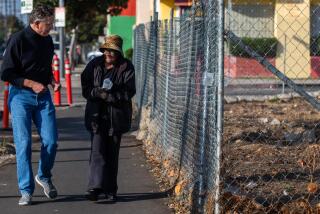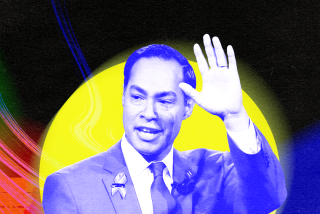The Loss of a Corporate Citizen
- Share via
Losing yet another corporate headquarters is a blow to Los Angeles, but the Atlantic Richfield Co.’s merger with BP Amoco means something else. Arco was more than a leading oil company on the West Coast: It was a leading citizen. It consciously defined “corporate citizenship” for many U.S. companies, and many U.S. communities, as well. The local economy probably doesn’t need a lot of corporate headquarters to survive, but the question of leadership for the city remains: Having the resources to invest is one thing, but understanding how to help and encouraging others to follow suit is quite another. That’s where Arco excelled.
In balmier days, Arco gave heavily and built great things in Los Angeles, from the Dome Village for the Homeless to the building at the Los Angeles County Museum of Art named after Robert O. Anderson, a former chief executive officer, and Arco Plaza at the Museum of Contemporary Art. Perhaps the company’s most enduring legacy was its contribution to the resurrection of the main library after a devastating fire in 1986. Then-CEO Lodrick M. Cook called Mayor Tom Bradley and offered immediate help, eventually pouring in time and money to save the books and head the campaign to rebuild the library.
Beginning with Thornton F. Bradshaw’s tenure as president in the early 1970s, Arco executives departed from the traditional business-school “bottom line” philosophy. Instead, they urged their employees to get involved in the community. Arco money and people made a big difference to the survival and prospering of Town Hall, one of the few serious forums for discussion of public affairs in the city. Unlike most local foundations, which are prone to be dominated by boards that try to solve problems and give only to those whom they trust, Arco gave to start programs, something novel in Los Angeles philanthropic circles.
In the late 1980s, when declining resources forced the company to relinquish its role of leading by being the largest donor to a cause, Arco rethought its civic mission. Capitalizing on its strength of having a professional staff who knew and engaged the city full time, it decided on a new course: Arco would be first funder and moving force behind new initiatives, new programs, new leaders. Because of the staff work the company did on each grant--compiling and checking the legal documents, for example--winning an Arco donation was a go-ahead to solicit other foundations and givers.
Arco’s was the “good philanthropist’s stamp of approval” that could clear away any uncertainty clouding a program’s value or its leaders. The company reassured the city’s generally conservative philanthropic community that certain causes were important to Los Angeles; and it reassured those who tried to address issues. Russell Sakaguchi, executive director of the Arco Foundation, recalls the times people said to him, “I remember the day the [Arco] check arrived. That’s when we became a real organization. That’s when we knew we were going to make it.”
The corporate philosophy that underlay the foundation’s work was community engagement. Money and the capacity to be first obviously facilitated this engagement. But Arco also related to L.A. by participating in major social and political movements in the last half of this century. For example, the company stopped reimbursing employees for memberships in clubs--most notably the California and Jonathan Clubs--with discriminatory practices. While company executives came from different backgrounds and had different personalities, from Anderson to Bradshaw, from Cook to current chief executive Mike R. Bowlin, they all were expected to think and act in the world around them. Not just the world affected by their business, like the environment, but by the worlds of people and communities.
Arco executives speak about the commonalities in civic involvement they see between themselves and BP Amoco. Maybe there is some overlap. Maybe not. Still, it’s hard to imagine BP Amoco retaining a professional staff on the ground in Los Angeles so the company can stay on the cutting edge of community life here, or continuing Arco’s Small Cities Initiative, which reached out to places where it had a corporate presence but never received requests for aid.
There are other corporations in L.A. that enjoy multiple ties to the community and are here to stay. Many of them give money and time to important civic causes. But Arco’s departure will create a hole in L.A.’s civic leadership that will not be easy to fill. Arco wants its philanthropic legacy to BP Amoco to be knowledge of how to connect to Los Angeles, and for the nonprofits here to learn how to connect to BP Amoco. “One of the traditions of leadership,” says Sakaguchi, “is to realize it’s a much bigger thing than your involvement.”
That would indeed be a graceful way for Arco to say goodbye.*
More to Read
The biggest entertainment stories
Get our big stories about Hollywood, film, television, music, arts, culture and more right in your inbox as soon as they publish.
You may occasionally receive promotional content from the Los Angeles Times.










